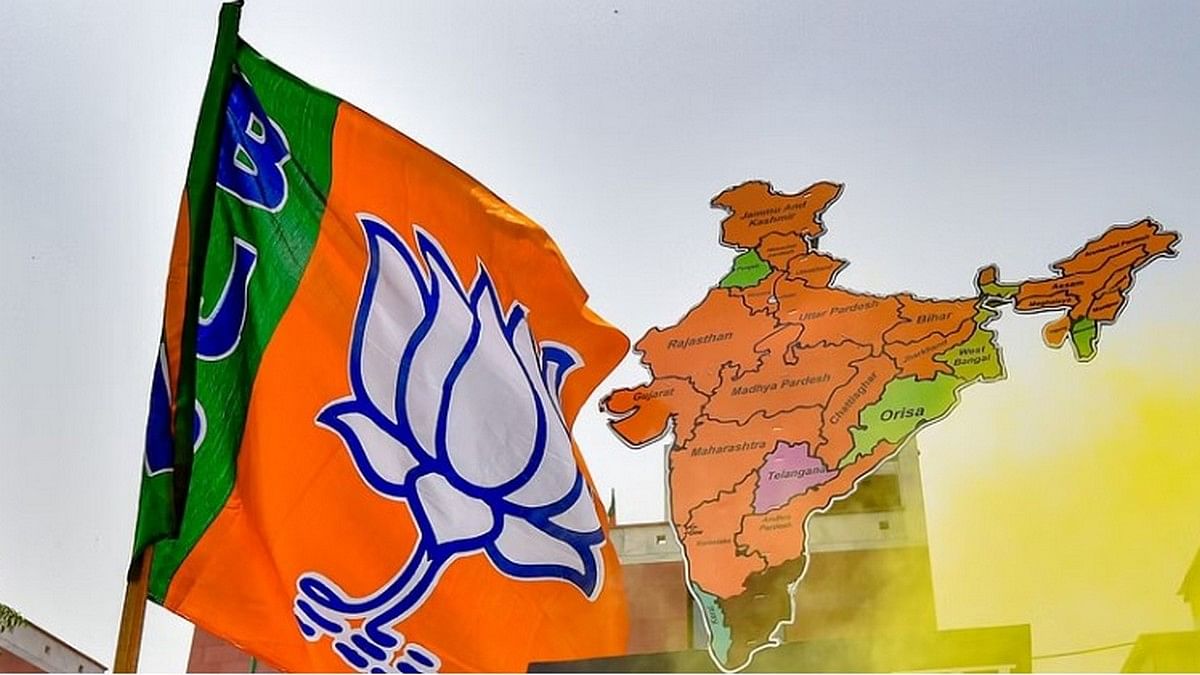New Delhi: The Lok Sabha elections have thrown up a paradoxical result wherein there has been only a marginal difference in the vote shares of parties, including that of the BJP and the Congress, but there has been a significant difference in the number of seats they have won.
The number of seats won by the BJP has dropped from 303 in 2019 to 240 in 2024. However, the party’s vote share has declined by less than 1 percentage point since 2019. While in 2019, the party’s vote share was 37.36 percent, in 2024, it is 36.56 percent.
Similarly, the Congress won 47 more seats in 2024 than it won in 2019 — 99 and 52 seats, respectively — however, its vote share has increased by less than 2 percentage points from 19.66 percent in 2019 to 21.19 percent in 2024.
There is a similar trend in the states.
In Andhra Pradesh, for instance, the Telugu Desam Party (TDP) won 16 of the 25 Lok Sabha seats from the state — up from just 3 in 2019. However, its vote share declined from 40.19 percent to 37.79 percent.
So, what explains this paradox?
One has to look at the state-wise vote share of the parties, argued political analyst Badri Narayan. “Their vote share might have dipped by just 1 percent nationally, but in Uttar Pradesh it has fallen by 8 percentage points, which is a significant decline,” he said. “That is covered up by their performance in other states like in the south, thereby pushing their total vote share up.”
In UP, where the BJP’s seat tally fell most drastically — from 62 in 2019 to 33 in 2024 — its vote share, too, fell significantly from 49.98 percent in 2019 to 41.37 percent in 2024. The Samajwadi Party’s (SP) seats increased from just five in 2019 to 37 in 2024 with its vote share also increasing by almost 20 percentage points from 18.11 percent in 2019 to 37 percent in 2024.
Yet, the over-8 percentage point decline in the BJP’s vote share in UP would have been partially covered up by the increase in its vote share in other states. For instance, in Tamil Nadu, where the BJP has not won any seat, its vote share has increased from 3.66 percent in 2019 to 11.24 percent in 2024. Similarly, in Odisha, the BJP’s vote share increased from 38.4 percent in 2019 to 45.34 percent in 2024.
This has a cancelling out effect, argued Centre for the study of Developing Societies (CSDS) researcher Abhinav P. Borbora. “If a party has a disproportionately high voting percentage in one constituency, even if it doesn’t win in any other constituency, its overall vote share increases, which is not necessarily reflective of the number of seats it has actually won.”
Similarly, it is possible that in some seats, a party loses by small margins, and wins in some seats by very big margins, thereby resulting in a good vote share.
Moreover, the BJP contested on 441 seats, while the Congress contested on 329. Therefore, its overall vote share is bound to be greater just by virtue of the higher number of seats it has contested from, Borbora added.
“Therefore, vote share as an indicator of a party’s performance should be used cautiously, and preferably in addition to other indicators,” he said.
Also read: BJP’s defector gamble flops, 69 of 110 candidates who switched over in Modi era lost 2024 LS polls
Regional parties
In West Bengal, the TMC, which managed to increase its tally from 22 in 2019 to 29 in 2024, saw an increase in its vote share from 43.3 percent to 45.76 percent.
The BJP, whose tally came down from 18 in 2019 to 12 in 2024, saw a decline in its vote share in the state from 40.7 percent to 38.73 percent.
In Tamil Nadu, the DMK’s vote share decreased from 33.52 percent in 2019 to 26.93 percent in 2024, and the number of seats it won fell from 24 to 22. The BJP, as mentioned earlier, increased its vote share in the state by almost 8 percent, even as it failed to open its account in terms of seats.
In Odisha, the Biju Janata Dal (BJD), which drew a blank in the Lok Sabha elections — down from 8 seats in 2019 — had its vote share decline from 42.8 percent to 37.53 percent. The BJP jumped from 8 to 20 seats in the state, while its vote share went up from 38.4 percent to 45.34 percent.
In Maharashtra, the Ajit Pawar-led NCP, which won just one seat, secured a vote share of 3.6 percent. The Sharad Pawar-led faction, which significantly outdid the former, won 8 seats, and secured a vote share of 10.27 percent.
Meanwhile, the Congress and the BJP in the state threw up the same paradoxical situation of a discrepancy between seats won and the vote share. While the Congress won 13 seats as opposed to the 9 seats won by the BJP, it lagged behind in terms of vote share, with the BJP securing a vote share of 26.18 percent, whereas the Congress’ vote share was 16.92 percent.
(Edited by Zinnia Ray Chaudhuri)
Also read: 2024 election mandate in UP is more against Yogi than Modi

